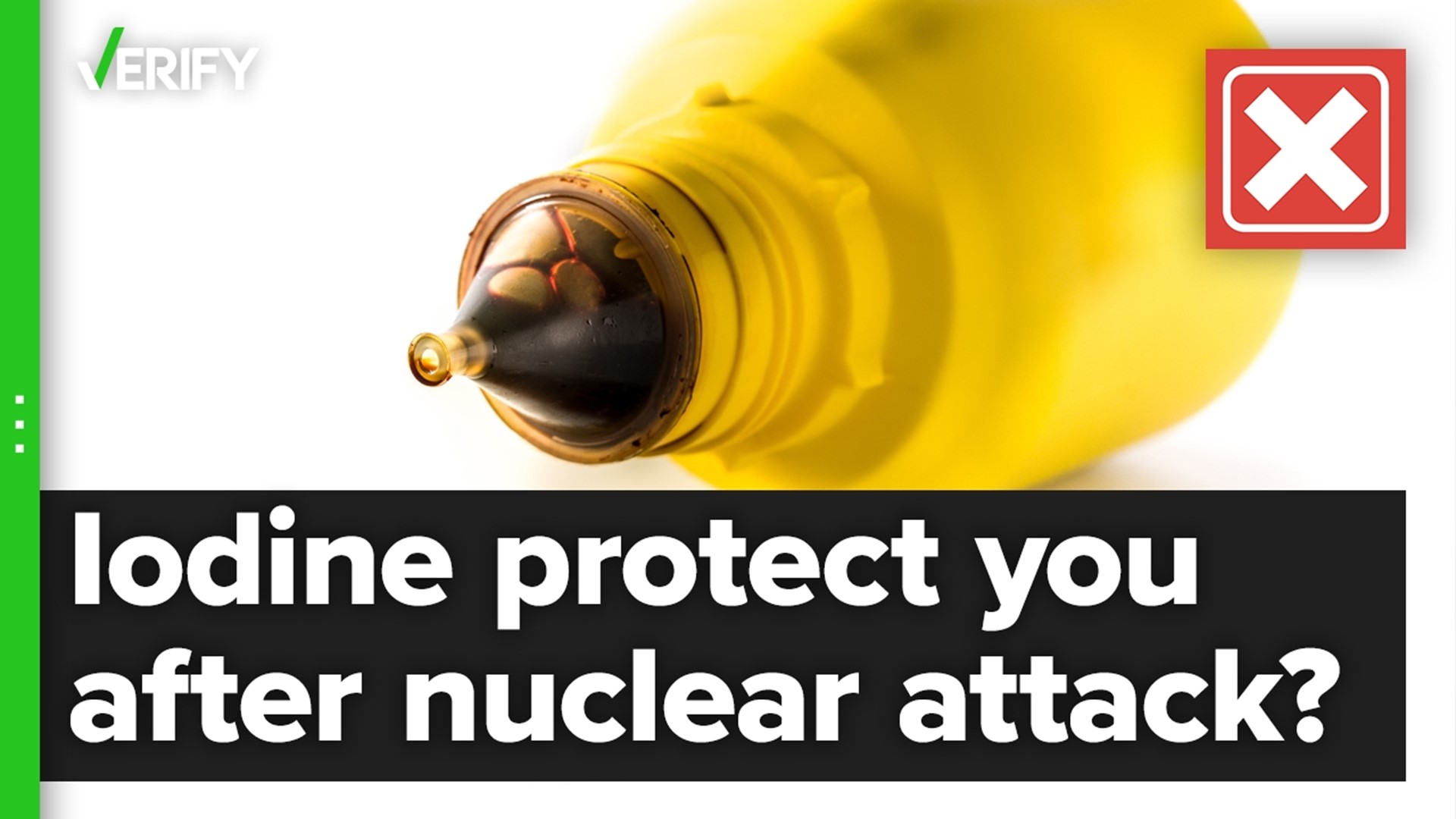In late February, only a few days after ordering an invasion of Ukraine, Russian President Vladimir Putin ordered his nuclear forces be put on high alert.
That alarmed governments and people around the world, but especially citizens of Central Europe forced to confront the idea of a Russian nuclear attack on their continent.
Shortly after Putin’s announcement, there were reports of people across Europe stocking up on iodine pills, which are sometimes administered to people in the vicinity of nuclear energy accidents. But some experts on social media said the pills don’t protect people from most effects of a nuclear attack.
THE QUESTION
Can iodine pills protect you from most radiation effects in a nuclear attack?
THE SOURCES
Dana Drábová, Chairperson for the Czech State Office for Nuclear Safety
Jerrold Bushberg, Ph.D., Chair of Board of Directors, National Council on Radiation Protection & Measurements
THE ANSWER
No, iodine pills won’t protect you from most radiation effects in a nuclear attack.
WHAT WE FOUND
Over-the-counter iodine pills, which contain the chemical compound potassium iodide, are shown to be useful in preventing thyroid cancer caused by radioactive iodine, especially in children.
It works by basically loading up your thyroid with healthy, normal iodine so that there’s no room for the radioactive version.
“In the early phase of a typical nuclear accident, like… a meltdown [at a power plant]... there is efficacy for distributing potassium iodide [to] the local surrounding area to minimize the amount of iodine taken up by the thyroid gland,” said Jerrold Bushberg, Chair of Board of Directors for the National Council on Radiation Protection & Measurements.
Following a meltdown, exposure to radioactive iodine can vary depending on a number of factors, including the nature and magnitude of the accident, the surrounding terrain, speed and direction of winds, and physical structures. Governments may consider these factors when determining who to recommend or distribute iodine pills to.
But iodine distribution is just a minor part of the response. A World Health Organization document, for instance, says evacuation, sheltering, and removing contaminated crops or livestock from the food supply may be more broadly effective.
“It should be noted that while the other countermeasures protect against most radionuclides and external exposure, iodine prophylaxis protects only against inhaled or ingested radioiodine,” the guidance reads.
That’s because iodine pills do not prevent your body from absorbing other radioactive chemicals besides iodine.
That’s also why the pills aren’t useful in the event of a nuclear attack. A nuclear bomb rapidly spreads a lot more radioactive chemicals than just iodine, such as cesium and cobalt. It can even turn non-radioactive elements radioactive during the blast.
People in the relatively immediate vicinity of the explosion would likely be killed by the physical violence and heat of the explosion.
Those farther out who aren’t killed right away would face such high levels of radiation “you don't even want to send emergency medical crew[s, risking their safety]… because the people there… if they're not dead, they're going to be dead” within a matter of days, said Bushberg.
At a certain distance from the blast, Bushberg says lives can be saved, but the priority is treating injury and removing contaminated clothing to reduce exposure to a wide variety of radioactive material.
So in the scheme of a nuclear attack, iodine won’t do much.
“I think that that would be the least of your worries,” said Bushberg, adding it might be a comfort “from a psychological point of view, but I wouldn't want [people] to think that it was a cure-all” and ignore the threat of radiation as a result of taking the pill.
“They should still take the more positive action to distance themselves from the site of the detonation,” he said.
The leader of the Czech nuclear safety office called iodine “basically useless” in the event of a nuclear attack.
The Belgian Federal Agency for Nuclear Control, responding to reports of panic-buying, tweeted to discourage Europeans from taking iodine, which can have side effects if taken unnecessarily. Belgian, Czech, and American authorities all say to only take iodine if local or national public health or emergency response agencies specifically advise you to.
The FEMA-associated government site Ready.gov lists protocols for emergency preparedness in the event of either a nuclear attack or the meltdown of a nuclear power plant. Neither protocol includes taking iodine tablets.
More from VERIFY: No, Ukrainians are not selling actual Russian military tanks on eBay

